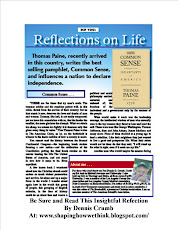 "You are the salt of the earth....You are the light of the world" (Matthew 5:12a,14a).
"You are the salt of the earth....You are the light of the world" (Matthew 5:12a,14a).William Wilberforce has been described as 'the greatest reformer in history." His legacy influenced the lives of kings and presidents and touched the poor and downtrodden in nations throughout the world. Born in the port city of Hull, England, on August 24, 1759, into a prosperous merchant family. Within months of graduating from St. John's College, Cambridge University in 1780 he secured a seat in the House of Commons as a member of Parliament for Hull--just a few days after his twenty-first birthday. Wishing to savor the success he had gained, Wilberforce set out on a tour of Europe with his family and a few invited friends. After several months, he returned in the midst of a spiritual crisis that had grown out of conversations he had with Isasc Milner, one of his traveling companions. Milner, an evangelical Anglican with a gift for winsomely articulating "the intellectual heart of Christianity" was a Fellow of the Royal Society (Britain's national academy of science) and later the president of Queen's College in Cambridge.
Wilberforce returned to London in the fall of 1785, full of doubts about his future. His conversations with Milner had convinced him of the truth of Christianity, but he did not see how, or if, a Christian could serve God in politics. No knowing where else to turn, Wilberfsorce sought out John Newton, the former slave-ship captain turned Anglican parson whom we remember today as the author of the hymn "Amazing Grace." Wilberforce had known Newton as a boy. Newton helped Wilberforce see that God had a special purpose for his life--that he could serve God in politics and make a difference there. By 1787, Wilberforce had taken up the charge for which we remember him today: the fight to abolish the British slave trade. And it was John Newton, the former slave trader, whom God used to help Wilberforce see that he should take this course. At the same time, Wilberforce had become deeply concerned with fostering moral and cultural renewal in Britain. God had set before him two great objects: the suppression of the slave trade and the work of moral reform.
Wilberforce waged what would be a 20 year fight to abolish Britain's slave trade, he began scores of philanthropic initiatives. He either led or was a member of at least 69 different benevolent societies. He was a founder and contributor to the Christian Observer, The Christianity Today for his time. He helped to found the Sierra Leone colony for freed slaves, the Royal Society for the Prevention of Cruelty to Animals, hospitals for the poor, Britain's Royal Institution. He was active in educational reform, prison reform, the promotion of public health initiative and advocating shorter working hours and improved conditions in factories. One of the most enduring aspects of Wilberforce's cultural apologetic was the publication of his book, A Practical View of the Prevailing Religious System...Contrasted with Real Christianity in 1797. by 1826, 15 editions had been printed in Britian, and 25 editions had been printed in the United States. It was translated into Dutch, French, German, Italian and Spanish. The book was a plea for his fellow Britons to embrace what he called vital, or authentic Christianity. This book was a declaration of Wilberforce's faith commitment, and as such touched people whose lives had been transformed by the truths of Christianity.
Due to poor health, Wilberforce retired from political life in February 1825, having served his nation for nearly 45 years. Three days before he died, he learned that Parliament would pass the legislation abolishing slavery throughout the British Empire. Among the many distinguished people who were influenced by Wilberforce were John Quincy Adams, John Jay, Thomas Jefferson, William Hooper, a signer of the declaration of Independence, Thoreau Emerson and many more. The influence of Wilberforce (and the Clapham circle) is not yer exhausted. Wilberforce University of Ohio, America's oldest African-American college, continues to educate young people in our day. Many today still draw inspiration from his legacy.
There is a tremendous need for people to rise up and be the "Salt and Light" to this world. The Gospel should be radiating out from our churches, the messages in the pulpit translated by those in the pews. Jesus broke into society with a radical, transforming message. The Church makes the invisible Kingdom visible.
Daily Prayer:
Humbly I approach your throne realizing that I have allowd the culture to shape me. Lord, I want to be used to further your kingdom, help me to become an Authentic Christian and be the "salt and light" bringing the "Good News" of your saving grace, and to make a difference in other people's lives. Amen





Where are our Wilberforces today?
ReplyDelete